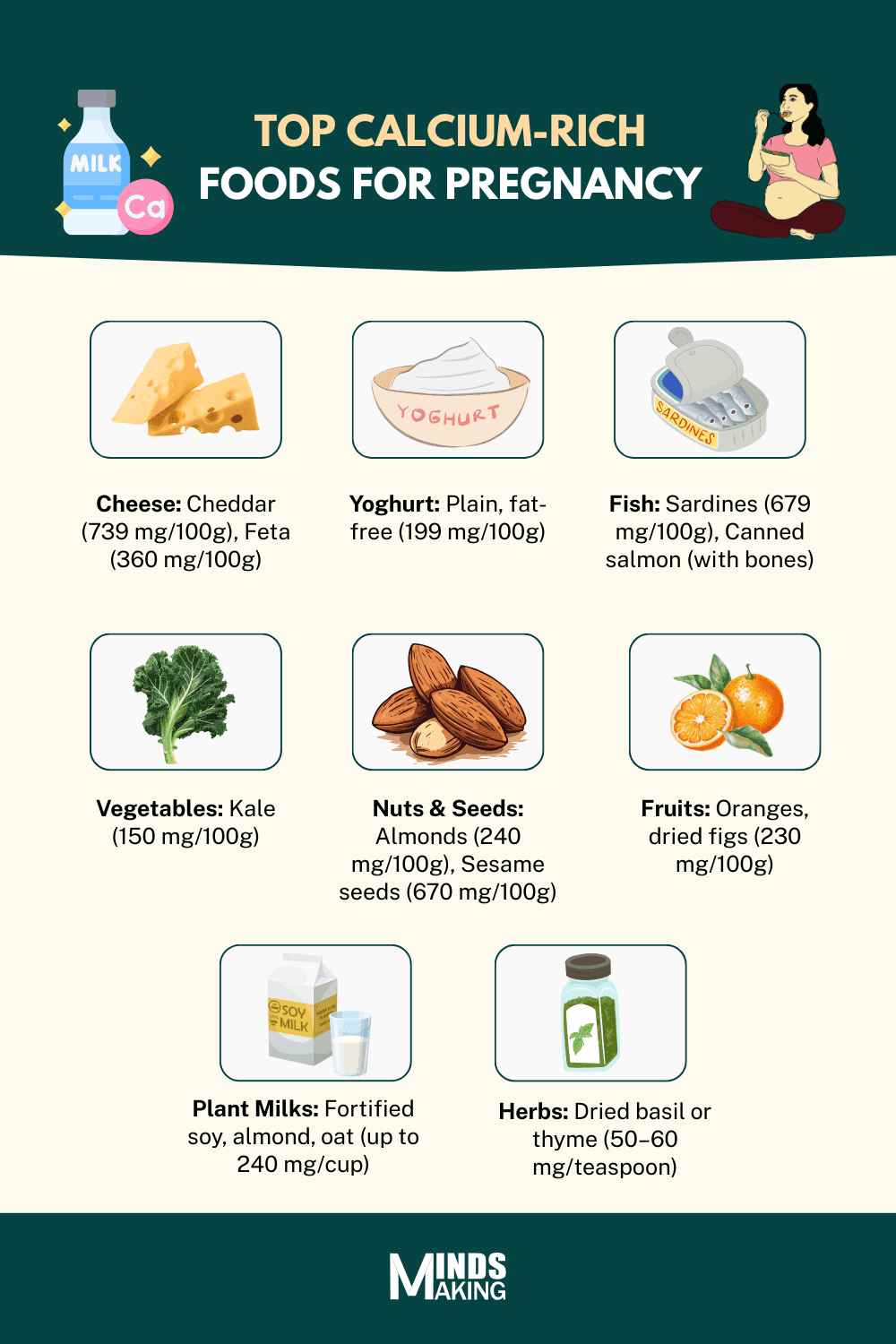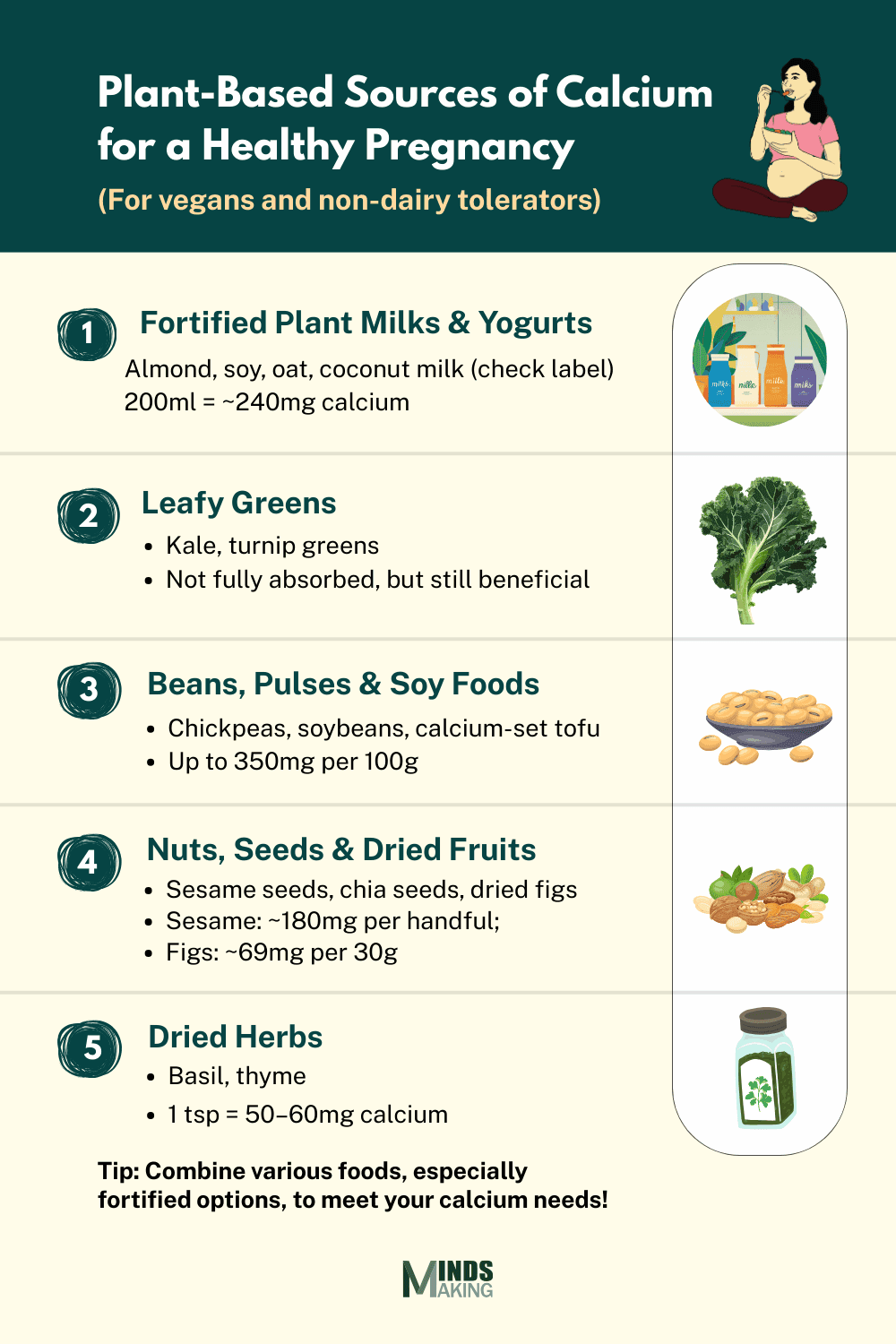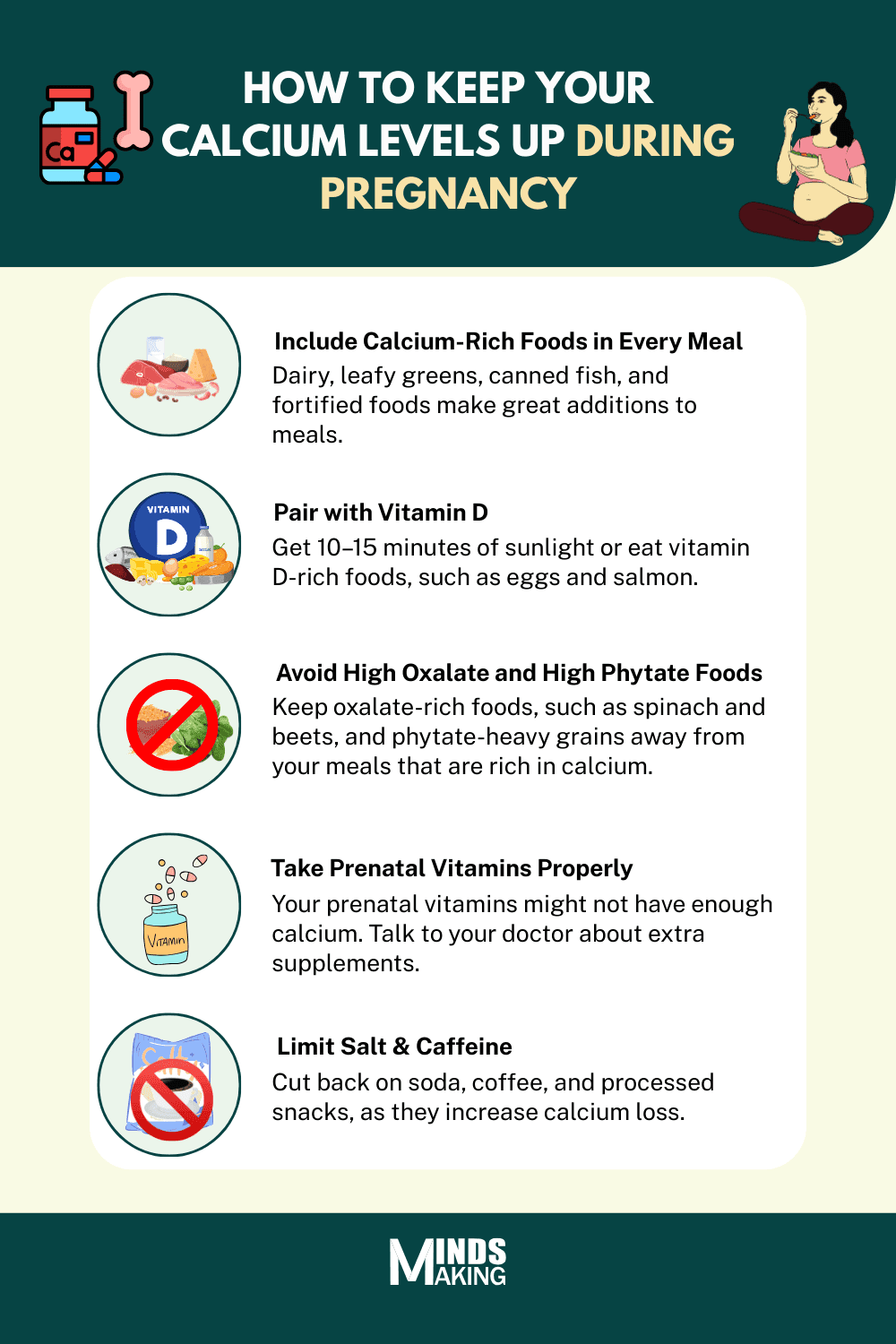Calcium During Pregnancy
Getty images

Written by Mindsmaking Medical Writer
Fact Checked by Mindsmaking Professionals
2nd, June, 2025
Calcium is important for both you and your developing baby. It ensures the proper development of your baby's teeth and bones while also keeping your bones strong. Here's how much you need, how to get it, and when to consider taking a supplement.
Calcium is one of the most important minerals the body needs to stay healthy. It is best known for building strong bones and teeth, but it also helps the muscles move, the nerves send messages, and the heart beat regularly.
Without enough calcium, many of the body’s basic functions can be affected, especially during pregnancy, when both the mother and baby need extra support. Low calcium levels, also known as hypocalcemia, can occur for various reasons. Sometimes, it's because you're not getting enough calcium from your diet.
Other times, it is linked to low vitamin D, kidney problems, or hormone issues that affect how the body uses calcium. Pregnant women are especially at risk because their growing baby takes calcium from their supply. (1)
Fortunately, low calcium can be managed by eating calcium-rich foods, getting enough vitamin D, and treating any underlying medical conditions that may be causing the deficiency.
Key Takeaways
Calcium plays a key role in building your baby’s bones and teeth, helping their heart beat normally, and supporting muscle and nerve functions.
According to the World Health Organization, in countries or regions where dietary calcium intake is low, a daily calcium supplement of 1.5g –2.0 g of oral elemental calcium is recommended.
Cheese, yogurt, vegetables like rhubarb and kale, fruits like almonds and oranges, and canned fish like sardines and salmon are the best sources of calcium.
According to the National Institutes of Health, low calcium levels are linked to preeclampsia, preterm birth, low birth weight, postpartum bleeding, and weakened bones or osteoporosis later in life.
To prevent calcium deficiency during pregnancy, focus on a diet rich in calcium and consider taking supplements if necessary. Also, ensure you get enough vitamin D, because it aids in calcium absorption.
Why Is Calcium Important During Pregnancy?
According to the National Institutes of Health, calcium is the most abundant mineral in the body; during pregnancy, your body needs it even more. (1)
Calcium plays a key role in building your baby’s bones and teeth, helping their heart beat normally, and supporting muscle and nerve functions. It is also essential for keeping your bones strong and healthy.
Most of your baby’s bone growth happens in the second half of pregnancy, especially in the third trimester, and by the time your baby is born, their skeleton will have stored about 20 to 30 grams of calcium, all coming from your body. (1)(7)
Pregnancy puts a lot of strain on your body, including your bones and muscles. If you don’t get enough calcium, your body will pull it from your bones to give to the baby. This can lead to bone loss, and over time, increase your risk of osteoporosis, a condition that causes bones to become weak and break more easily. (4)
The World Health Organization also points out that calcium can help lower your risk of high blood pressure and preeclampsia during pregnancy. These serious conditions can affect both you and your baby. (15)
That's why getting enough calcium during pregnancy is crucial. It helps your baby grow strong while also protecting your bones from becoming weak or brittle later on.
Do You Need to Take Calcium Supplements While Pregnant?
According to the World Health Organization, in countries or regions where dietary calcium intake is low, a daily calcium supplement of 1.5g –2.0 g of oral elemental calcium is recommended, starting around 20 weeks of gestation, especially if there is a higher risk of complications(16). This amount should be split into two or three doses daily to improve absorption and reduce side effects.
The recommended upper limit for total calcium intake from both diet and supplements combined is 2,500 mg per day for pregnant women between the ages of 19 and 50 years. (5)
You might also need a calcium supplement during pregnancy if:
- You are lactose intolerant or allergic to dairy.
- You follow a vegan or dairy-free diet.
- You consume less than 3 servings of calcium-rich foods per day.
- Your doctor has advised you to reduce sodium or protein intake, which might lower calcium absorption.
- You are at risk of preeclampsia, especially if you have a history of hypertension or are carrying multiples.
In these cases, calcium supplements will be prescribed to help fill the nutritional gap and reduce associated pregnancy complications. There are two main forms of calcium supplements: Calcium Carbonate and Calcium Citrate.
Calcium Carbonate contains more elemental calcium, about 40%. It is best taken with food because it requires stomach acid for absorption and is often more affordable.
Calcium Citrate, which contains about 21% elemental calcium, can be taken with or without food. It is also ideal for people with reduced stomach acid, common during pregnancy, or those on antacids, and is better tolerated in individuals with digestive sensitivities.
For your body to make the most of the calcium supplement prescribed by your doctor, take it in smaller doses of 500mg, as the body can only absorb that much at a time. (5)
If you start experiencing side effects like constipation, unusual weight loss, nausea, and vomiting, call your doctor right away or ask your doctor about switching forms. (17)(10)
What Are the Best Calcium-Rich Foods to Eat During Pregnancy?
Calcium-rich foods like dairy products, vegetables, and canned fish with bones are excellent choices during pregnancy. Fortified foods, such as fortified soy drinks, bread, and cereals, also contribute significantly to calcium intake.
Many natural foods are rich in calcium. Some of the best sources include(11):
- Cheddar cheese (739 mg/100g)
- Sardines (679 mg/100g)
- Sesame seeds (670 mg/100g)
- Feta cheese (360 mg/100g)
- Almonds (240 mg/100g)
- Dried figs (230 mg/100g)
- Kale (150 mg/100g)
- Plain fat-free yoghurt (199 mg/100g)
- Soya drinks (120 mg/100g)
Mindsmaking

Read This Next
No posts available
Tips For Boosting Calcium Absorption Through Diet
Getting enough calcium is one thing; helping your body absorb it well is another. A few simple diet tips, like pairing nutrients wisely and spacing out your intake, can make a big difference in how much calcium your body actually uses during pregnancy.
Here are some easy ways to boost calcium absorption through your diet:
- Your body can only absorb about 500mg at a time, so it's better to spread your intake throughout the day.
- Vitamin D helps increase absorption, so pair calcium-rich foods with vitamin D-rich options or get sunlight when possible(8). For example, Muesli with soy milk and a side of scrambled eggs, sardines on toast, or baked salmon with steamed kale or broccoli, plus a side of brown rice.
- Vitamin K helps with calcium metabolism, so include vitamin K-rich foods like kale and cruciferous vegetables, such as broccoli and Brussels sprouts, in your meals. For example, enjoy a salad with leafy greens and add dairy or non-dairy sources of calcium.
- Also, try not to take calcium and iron simultaneously, as they can interfere with each other. Space them out by a few hours.
- While spinach is healthy, it contains oxalates, which can block calcium absorption, making it not the best source of calcium.
Foods and Drinks That Can Block Calcium Absorption
Getting enough calcium is important during pregnancy, but some foods and drinks, such as those high in oxalates, phytates, salt, or caffeine, can block absorption or increase calcium loss.
Foods High in Oxalates
Oxalates are natural substances that stick to calcium in your gut and stop it from being absorbed(12). Foods high in oxalates are:
- Spinach
- Chocolate and cocoa
- Beet greens
Some other foods, such as sweet potatoes, beans, soy, kale, and okra, also contain oxalates, but in lower amounts. These are still good to eat, especially when balanced with other calcium-rich foods.
Foods High in Phytates
Phytates or phytic acid are found in seeds, nuts, whole grains, and legumes. Like oxalates, they can block the absorption of calcium. You will find them in:
- Lentils
- Chickpeas
- Whole wheat
- Sunflower and sesame seeds
Salty Foods
Eating a lot of salty foods can cause your body to lose more calcium in your urine. Salt and calcium compete in the kidneys, so more salt means more calcium is flushed out.
Drinks with Caffeine
Drinking too much coffee or energy drinks can increase calcium loss through urine. This can be a bigger issue for adults and postmenopausal women.
Plant-Based Sources of Calcium for a Healthy Pregnancy
If you're a vegan or can't tolerate dairy, getting enough calcium with the right foods is still possible. Here are some great plant-based options to help keep your bones strong and support your baby’s development:(3)
Fortified Plant Milks and Yogurts: Drinks like almond, soya, oat, and coconut milk often have added calcium, just check the label. A 200ml cup can give you about 240mg.
Leafy Greens: Vegetables like kale and turnip greens contain calcium, but your body may not absorb it all. Still, they are a healthy choice and worth adding in.
Beans, Pulses, and Soy Foods: Cooked beans, such as chickpeas and soybeans, and calcium-set tofu are helpful. The best sources contain up to 350 mg per 100g.
Nuts, Seeds, and Dried Fruits: Sesame and chia seeds pack a calcium punch, over 180 mg in just a small handful. Dried figs are also tasty, with 69mg in a 30g serving.
Dried Herbs: Herbs like dried basil or thyme can add extra calcium to your meals. Just a teaspoon can give you 50–60mg.
Mixing various foods into your meal, especially the fortified ones, can help you get the calcium you need, even if you don't eat dairy.
Mindsmaking

What Happens If You Don’t Get Enough Calcium During Pregnancy?
If you do not get enough calcium during pregnancy, it can lead to serious health problems for both you and your baby. According to the National Institutes of Health, low calcium levels are linked to preeclampsia, preterm birth, low birth weight, postpartum hemorrhage, and weakened bones or osteoporosis later in life. (1)
More noticeable signs and symptoms that show you don't have enough calcium in your body are;
- Numbness or tingling in your fingers, toes, or around your mouth,
- Muscle cramps or twitching.
In more serious cases, it can lead to
- Muscle spasms (twitching of the muscle)
- Seizures
- Confusion, or even dangerous heart problems like irregular heartbeat or low blood pressure. (2)
Not getting enough calcium during pregnancy can cause long-term and short-term problems for you and your baby. Your body will take calcium from your bones to support your baby, which can lead to weaker bones and lower bone density in the short term.
You might also experience muscle cramps or feel weak, since calcium helps your muscles work properly. Low calcium levels can also raise your risk of high blood pressure during pregnancy.
Not getting enough calcium can lead to poor bone and tooth development in the baby and may result in low birth weight.
In the long term, calcium deficiency can cause lasting health issues. For the mother, it can lead to weaker bones later in life, increasing the risk of conditions like osteopenia and osteoporosis, which make bones more likely to break.
For the developing baby, low calcium during pregnancy can lead to stunted growth, multiple sclerosis, and a higher chance of developing rickets, a condition that causes soft bones. It can also reduce the baby’s bone strength as they grow older. (13)
Tips for Preventing Low Calcium During Pregnancy
To prevent calcium deficiency during pregnancy, focus on maintaining a healthy lifestyle and a calcium-rich diet. Consider taking supplements if necessary. Ensure you get enough vitamin D, as it aids in calcium absorption. This helps prevent complications like muscle cramps or bone density loss during pregnancy. (12)
Include Calcium-Rich Foods in Every Meal
Include foods naturally high in calcium in your everyday meals. These include:
- Dairy products like milk, yogurt, and cheese
- Leafy greens such as kale and bok choy
- Calcium-fortified foods like orange juice, cereals, and plant-based milks
- Fish with edible bones, like sardines and canned salmon
Your body absorbs calcium from food better than from supplements.
Pair Calcium with Vitamin D
Vitamin D helps your body absorb calcium. Without enough vitamin D, your calcium intake won’t be as effective.
- Spend short periods, 10–15 minutes, in sunlight daily.
- Include foods like eggs, salmon, and fortified products.
Avoid High-Oxalate and High-Phytate Foods
Foods high in oxalates, such as beets and rhubarb, as well as phytates like bran, can interfere with calcium absorption. Therefore, avoid pairing them with your main sources of calcium.
Take Your Prenatal Vitamins as Prescribed
Most prenatal vitamins include calcium, but not always in sufficient amounts. Ask your doctor if you need a separate calcium supplement, especially in your second and third trimesters when your body's demand for calcium increases. (6)
Limit Caffeine and High-Sodium Foods
Too much caffeine or salt can lead to calcium loss through urine. Try to limit your intake of coffee, soda, and processed foods.
Maintaining a healthy calcium level during pregnancy is necessary for both your well-being and your baby’s development.
Mindsmakin

Frequently Asked Questions
Can I take calcium supplements during pregnancy?
Yes, you can. Pregnant women are generally advised to take calcium supplements, especially if their diet is low in calcium. The World Health Organization recommends 1.5–2.0 grams of elemental calcium per day for pregnant women with a low calcium intake. This helps reduce the risk of pre-eclampsia and other complications associated with low calcium levels during pregnancy.
Is it possible to get too much calcium?
Yes, it is possible to get too much calcium, leading to a condition called hypercalcemia, where there is an abnormally high level of calcium in the blood. While getting calcium from food alone is unlikely to cause this, excessive supplementation or certain medical conditions can raise your blood calcium level to a dangerous level.
Can calcium help prevent pregnancy complications?
Yes, calcium supplementation during pregnancy can help prevent pregnancy complications, particularly pre-eclampsia, by lowering the risk of you developing this condition.
Can I take calcium with prenatal vitamins?
Yes, you can take calcium with prenatal vitamins, but it is generally recommended to space them out by at least two hours to optimize iron absorption. Prenatal vitamins most time contain a little bit of calcium. Still, if you are trying to meet your daily calcium needs or have concerns about meeting them through diet alone, you may need to supplement with additional calcium.
Can too much calcium be harmful during pregnancy?
Yes, it can be harmful. Calcium is an essential mineral for both you and your developing baby, but exceeding the recommended daily intake can lead to different health problems. Excessive intake of calcium can hinder the absorption of other minerals, such as zinc and iron, potentially causing constipation, kidney stones, and even affecting fetal development.
What are the non-dairy sources of calcium?
Non-dairy sources of calcium include dark, leafy green vegetables like kale and broccoli, canned fish with soft bones such as salmon and sardines, fortified plant-based milks, tofu, and seeds and nuts. Some fruits, like dried figs, and beans, like edamame, are also good non-dairy sources of calcium.
Do prenatal vitamins have enough calcium?
No, most prenatal vitamins do not contain enough calcium to meet the recommended daily intake of 1,000 milligrams for pregnant women.
Was this article helpful?
How many stars are you giving this article?
Leave a comment
Your email address will not be published.









































